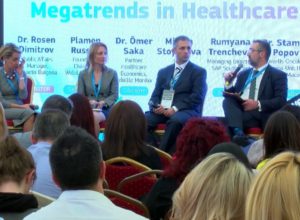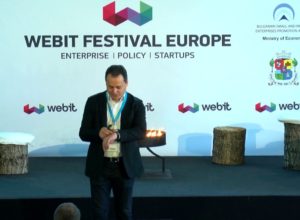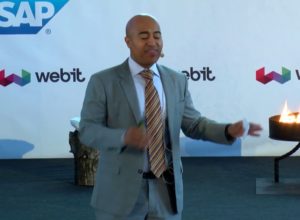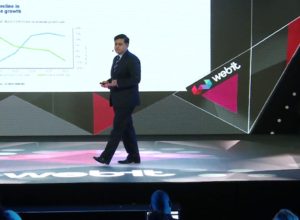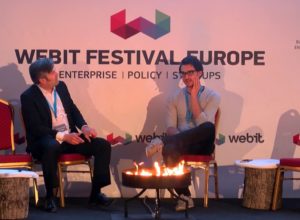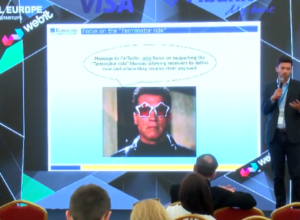Do borders matter in the digital world?
At last year’s Webit.Festival in Sofia the topics and discussions on Big Data were more than plenty. This comes as no surprise since in the last few years the world’s population has generated more data than ever coming from all kinds of connected devices. “Big Data” has become the buzzword of our time, creating more and more… buzz.
Mr. Peter Rahnev is the CEO of oblak.bg - the first Bulgarian company to start exposing a limitless scalability and unending possibilities of cloud computing technology. His keynote at the festival laid out his vision on how regional cloud providers are becoming more and more equally important standing next to the global ones.
Global and local service providers both have their strengths and weaknesses
When your business is connected to a global service provider, it is very much dependent on the Internet connectivity. This connectivity can be easily regulated, manipulated and restricted by governments. Wars and terrorism, Rahnev says, have been affecting both the physical and digital world. Countries have been disconnected from Internet services, social networking and a free access to information. To the 21st century contemporary human, such restrictions on the Internet usage probably equal to “social death” as the saying goes.A good example on how governments put restrictions on one another...
...is the sanctions to the Russian federation in 2014. One of them was the threat of being banned from the electronic payments system. The outcome might have been a bit unexpected to a certain level - the Russians have created their own system for electronic payments in response. Regional service providers have the advantage of flexibility. The local connectivity inside a country would be able to allow businesses to maintain their operations while there’s an unexpected global crash or restrictions applied. One wouldn’t have to worry which borders the data they’re storing crosses, where it is, where it goes and which regulations should be complied.Megatrends in Healthcare
Webit.Festival Europe 2017 shaped the milestones for all things digital in healthcare
The topic will be continued in 2018 with a separate 2-day event called Webit.Health co-chaired by Plamen Russev, the Chairman of Webit Foundation and Prof. Shafi Ahmed, Co-founder and surgeon of Medical Realities. Make sure to book your tickets now, at the Super earlybird price here. 2017 health Summit saw some of the biggest companies’ representatives in the world sitting together in a panel discussion - Rumyana Trencheva, Managing director SAP SountEast Europe, Mr Omer Saka, Partner at Deloitte, Dr Stamen Popov, General Manager Oncology of Novartis and Milena Stoycheva, CEO of JA Bulgaria, moderated by Dr. Rosen Dimitrov, Public Affairs Manager at Novartis. You have a vast experience in healthcare and innovations and wish to tell us about it - apply for speaking here. Ms Trencheva gave a good start of the discussion assuring that megatrends all over the world are not something selected, they are not happening in selected, VIP, countries - they are spreading. The contemporary consumer is demands more and more from the pharmaceuticals, from the technology companies and it is becoming ever more challenging to make sure consumers’ needs are met.The change of our perception on what healthcare is
Another megatrend that was clearly stated by Mr Saka is the change of our perception on what healthcare is do we mean a pill, a medical device of some kind or a hospital bed. The key solution is finding a way for these three elements to work together in the modern healthcare system. Furthermore, the matter of how much we, as consumers, pay for healthcare came to forefront. It is expected that in the next 10 years or less patients will be treated and will be provided with solutions that go beyond the pill - and this is for the mass, not only for the selected ones who can afford it. Dr Popov clearly stated that pharmaceutical companies no longer rely on the pill as a method of treatment - they broaden their vision using the digital technologies and these solutions will very soon come to patients who need them. This gives a huge advantage - transparency. Each of us, as human beings, is a data center, based on the choices we make every single day. In fact, transparency in healthcare system is a major block each of the technology companies all over the world are trying to achieve.With this follows one of the most important Megatrends - prevention as the form of treatment
It is considered that people nowadays take more and more care of themselves - in the form of wellness. We will have a huge number of population taking great measurements to maintain their health; in order to survive, people will take ownership on one’s health, environment and the ecosystem as well as putting efforts into changing the ecosystem. Finally, all these megatrends are impossible to happen without collaboration of technology companies, startups to bring fresh ideas and doctors. There’s no need for an engineer to develop an app by himself when they clearly don’t know specifics, rather, it is the healthcare industry to develop and change the ecosystem. Going out of the pharmaceutical industry, the biggest companies are also working on building connections with physicians and to use these relations to integrate new type of companies into this world. Webit.Health will continue this kinds of discussions in 26th - 27th June with ever more interesting guests who will show in action and demonstrate the modern healthcare - something that is happening now, not some time in the future. If you have an interesting idea and your company is less than 5 years old - show it by applying here.Central & Eastern Europe risk-capital ecosystem on the world’s map
Webit.Festival - a place for minds to meet. Marius Ghenea, the Investment Director of 3TS Capital gave a keynote at last year’s edition about seizing opportunities and avoiding pitfalls in the fast-growing Central & Eastern Europe risk-capital ecosystem.
3TS Capital has been investing in countries in the CEE region for quite some time and Marius, as a serial entrepreneur and angel investor himself has gained deep insight on the specifics of this market.
Though being quite underestimated in the years back in time, CEE is slowly but surely getting its footprint in business, tech and innovations. The region has drawn attention not only with unicorns such as Skype, Avast, Transferwise and AeroMobil but also with the emergence of multiple, active and growing startup ecosystems across and around.
CEE sure has its historical, economical and national challenges to overcome
The diversity of this region consists of countries in the EU, countries yet to join the EU, countries with an “on the way” developed startup ecosystem and ones that have yet to work towards the achievement of it. This calls for quite a turbulent, hard to define business environment with ounces of political, ethical and cultural differences ranging for each country. Despite the tiny late development, things are starting to look more and more promising. The IT sector has been rapidly growing, adding to a growing GDP for some of the countries. In the last years, we have seen business association networks popping up in the region. One of the things happening more often now is that a growing number of these national and regional associations have been connecting with large organizations and business angel associations on a European and worldwide level. Webit.Festival gathers exactly the people, entrepreneurs and investors involved in this ecosystem mixed with players in the worldwide scene to create a colorful mix. Check our website for more details of the 2018 upcoming edition.Double bet: augmenting reality and Artificial Intelligence
Magic Leap, the all-mysterious company working on Augmented Reality projects since some years has released its own set of VR glasses today. It is not the first and certainly not the last company being active in the tide of enhancing the physical reality. Artificial Intelligence & Augmented Reality have become two concepts which are so modern, used and worked on these days one thinks that if anyone ever had a thought these two would pass as a vain trend for a day or two should have done their research better.
Many doors and possibilities in the future of tech development are created because of the intertwine and mutual use of these two technologies. All the new technologies and gadgets are somehow combining in this big clash that makes one wonder where all of this is going.
Augmenting reality, but also augmenting Artificial Intelligence? Now that’s a proper double
At Webit.Festival 2017 in the CEO of ARX Mark Val emphasized on the growing interest of companies in the field of Artificial Intelligence. He also made a point that the two double letter tech disruptors AI & VR are starting to intertwine around each other in a way to create bigger, more appealing and challenging opportunities. Back in the days which some have seen and lived in, games were played with joysticks on consoles attached to an old fashioned TV box. Thinking of the evolution of passing from rough barely moving images through 2D graphics and the birth of Playstation all the way to Virtual Reality games and controlling with simply using gaze and gestures seems somehow natural yet bringing more questions about what direction shall technology development take. The mixture of AI and VR is speeding up and AI will for the first time be able to take people as assets of computing. It can learn from our movements and surroundings, thus suggesting improvement and augmentation to what we’re looking at, walking through or even while calmly sitting on the couch. Interactive applications adding experience to museums’ paintings, books in libraries is one of the ways this technology is already used for good. Audiences finding such cultural experiences a bit dull are engaged in a fun and creative way and hopefully, brought into further interest in such old fashioned ways to spend some free time on. More or less, for good or bad, people are becoming more and more connected with their mobile devices and virtual possibilities, addicting as they are. Why not make a good use of all the tech boom for a profitable not only in a material, but a cultural context as well?Language learning apps
Markus Witte, one of the founders of babbel.com, a friendly-user language app, that has made learning a new language fun. At Webit.Festival Europe 2017 Markus talked about disrupting a market, cleared the term disruption and made an overview of his product - the learning app.
Below you can find the main ideas Markus shared before 500 people at the Education Summit @Webit 2017.
What does it really mean to be disruptive?
Everybody seems to be talking about it. The notion of disruption is very fussy these days. Disruption is really about industries, about markets. For the past year only Business wire has more than 2,000 disruptive companies, that’s more than 8 per day.That is scary!
The problem with this is that companies, industries usually don’t have needs or urges. People do. Just think about it, it is people who want to learn a language and language learning is a real problem. Markus compares that problem with language learning and its solution as the need for a person to listen to music and going to a live concert. Digital technology is the solution for this problem - for removing barriers to do something whenever, wherever you want to. The old methodologies are good, they do work and teachers are still an important element when it comes to teaching but you can’t have it at your disposal all the time. What proved to be harder than anyone thought, they started it, and they created solution. None of the babbel.com founders was a language teacher, or had specific knowledge on teaching, so they started disrupting from users perspective. After all, they were users, too, right. As Markus’s speech goes on, it becomes clear that the initial idea is not about disruption, not about the market, rather than the fact people actually managed to make a conversation in just several lessons. All this through games. But this is not a game. Games are inspiring when it comes to creativity and solutions, but one thing games have is they are self referential and as much as the fantasy of learning just being a game. We usually want other references, as well, we want to make a sensible conversation outside the game.In conclusion, аll this talk on disruption is somehow pointless.
Why disrupt a market, when all companies, tech people, ever do is solve problems. A user has a problem - the tech person creates the solution and that’s it. The market, the money, the profit comes next, they do. Let’s talk about solutions more than we talk about disruption. Stay tuned with the latest innovations by booking a ticket to Webit.festival Europe 2018Privacy, Security and Internet of This, That & Tomorrow
Travis LeBlanc, former Chief of Enforcement Bureau at the Federal Communications Commission
Free Internet access - a thing available at the click of a mouse or a tap on a screen for most people. But in the not so far future this wasn’t the case. An open and free Internet access still isn’t the case in a number of countries around the world. Though the UN has proclaimed Internet access as a human right.Privacy, Security and Internet of This, That & TomorrowNowadays almost all newly launched companies rely heavily on the Internet ecosystem
This trend carries numerous possibilities with it, combined with numerous unknowns too. The number of connected devices is constantly increasing. This includes not only our smartphones but any IoT devices ranging from connected vehicles through surveillance systems to our hairbrush. The IoT boom certainly provides benefits - creating smart devices, managing energy efficiency, forecasting needed repairs or whatever need it is. But at the same time carrying a number of threats with it. There have been cases as hackers obtaining personal data from institutions, taking control on connected cars and even being able to reach to a person’s pacemaker. All this serves as an example reminding us how insecure the devices we so heavily rely on are. Three years ago, the Federal Communications Commission has issued regulations to prevent broadband Internet service providers from controlling the access that consumers have to the Internet, from choosing which websites and apps we can use - basically, from choosing the winners and losers on the Internet. It has also taken measures in order to protect broadband privacy, to ensure that consumers know what particular information about them is collected from these providers, what do they do with it and to prohibit them from selling the consumers’ information without their consent.Recently though, these regulations have been reversed
Service providers are able to sell consumers’ information such as browsing history, apps downloaded, location, etc. to the highest bidder, be it the government, marketers or certain bad actors. That is enough scary of a concept by itself, having in mind how much information is contained in the smart devices we use daily. Governments and regulators should proceed from the point that everything can be hacked. At some point, it’s very likely to happen and prompt measures need to be taken to prevent or at least minimize the harm. This concerns all companies creating products and services for the market. Security and privacy issues need to be considered from the start of developing a certain product. They should not be left for figuring out after the process has finished and the damage has already been done. If you want to stay tuned with evolving security & privacy matters, the Webit.Festival 2018 in Sofia gathers some of the world’s pioneers on the subject.M&A as a Fuel to Innovation
Sriram Prakash, the Global Lead for Innovation M&A and Venturing Services at Deloitte was one of the speakers at Webit.Festival Investments Summit who shared his insight about fueling growth through innovation M&A.
Living in an economy of expectations
An innovation can come from anywhere.It can come from a small unknown town in India, it can come from a booming city like New York, it can come from anywhere. If you want to turn your innovation into a billion dollar business though, you need some extra things than the idea itself. You need an ecosystem, you need entrepreneurs and corporates, you need the governments and different policy makers. And in fact, there are very few cities and ecosystems allowing you to do that but this doesn’t mean that your ideas can’t travel. Ideas have no boundaries anymore and that’s become quite an advantage for all market players. Markets are full of uncertainty today, they are getting saturated and there’s a backlash against globalization. For the past three years revenue growth rates has been on the decline but the share price are on the rise. That’s why innovation has become such a strong priority for companies to grow. Mergers & acquisitions is one of the ways for companies to tap into innovations happening outside of their private ecosystem rather than trying to focus on purely growing organically.More and more non-technological companies are investing in and acquiring tech companies
This means that a nowadays startup has the option of not just one but more exits and more than one sectors that could be interested in its particular innovation. The process is not one-way only. It’s not only old companies trying to go into digital. Startup companies are also buying some old style companies depending on their needs. Most of the disruptors under the scope of corporates are AI, Robotics, Big Data, Analytics and IoT, finally coming to a stage where the commercial potential can be realised. Venture capital & investment companies trying to get their way through the field should be better in the way of trying to find what people want rather than trying to invent the next Facebook or Uber. The biggest battle is for the future of consumers and the consumer industry as changing as it is. Companies of different sectors are merging and acquiring others out of their area of business and specialization. We see healthcare industry mixing with Fintech, IoT with Data and all together. For the first time there’s a genuine convergence between non-traditional sectors converging around a particular opportunity.New Paradigms in Mobility
When we think for a minute about mobility and transportation, it is a thing so ordinary and habitual to our lives that we don’t even realize how essential it is.
If we think about what our lives would have been without access to mobility and transportation, to say we’ll have quite a challenging day wouldn’t be enough to portray what a day without these facilities would look like. Even more, to the present-day, so accommodated to technology generation.
The Managing Partner at New Mobility Consulting Alexander Renz presented his vision on the future of mobility at Webit.Festival 2017 in Sofia. One of the trends in mobility is connected vehicles. Vehicles become connected, these connected vehicles become part of the Internet of Things, which implies quite a lot of security risks, but also opportunities to deliver new services to the vehicle and customers. Another trend is autonomy, the role of AI self-driving cars, drones, and who knows where it’ll end. A future of cars driving around looking for passengers to pick up or to deliver goods from town to town is not unimaginable at all.
Thanks to Elon Musk we’re on the way to accomplish zero emission mobility, enabled by electric cars and infrastructure. It doesn’t only concern about creating the vehicle but a complete system with energy generation, electric charging infrastructure and the vehicles adapted to the new system.
The major problems in cities - parking, deliveries, ticketing, faster and better transportation and infrastructure are all on the table of resolving. The key thing is, that this is no longer a world where technology plays a role in making things better but it’s a complete technology driven transformation of a critical sector.
This transformation of mobility will impact a lot of different industries.
The model of owning a car has been already challenged since the birth of Uber, Lyft and other examples of the sharing economy. Once we're ready and sit in our self driving vehicles, the monetization model of the future would be very different from today - the use of Internet services, the type of content we'll consume in in our added spare time while we don't have to drive. Mobility and transportation is an industry being heavily disrupted and has yet to be disrupted, still.Trends in cross-border payments
[embed]https://www.youtube.com/watch?v=OsBtydb2Pqc&t[/embed]
2017 Webit stage saw the cooperation of two people - the one with years of experience in the sphere of fintech - Michel Stuijt, the CEO of Eurogiro, and the great, innovative mind Or Benoz, co-founder of Rewire. They both investigated the trends in cross-border payments.
In his experience, Michel opens the discussion, he outlined a four expectations of what people see in the future of payments:
-
Free
-
Fast, if not instant
-
Secure
-
Full withdrawal

